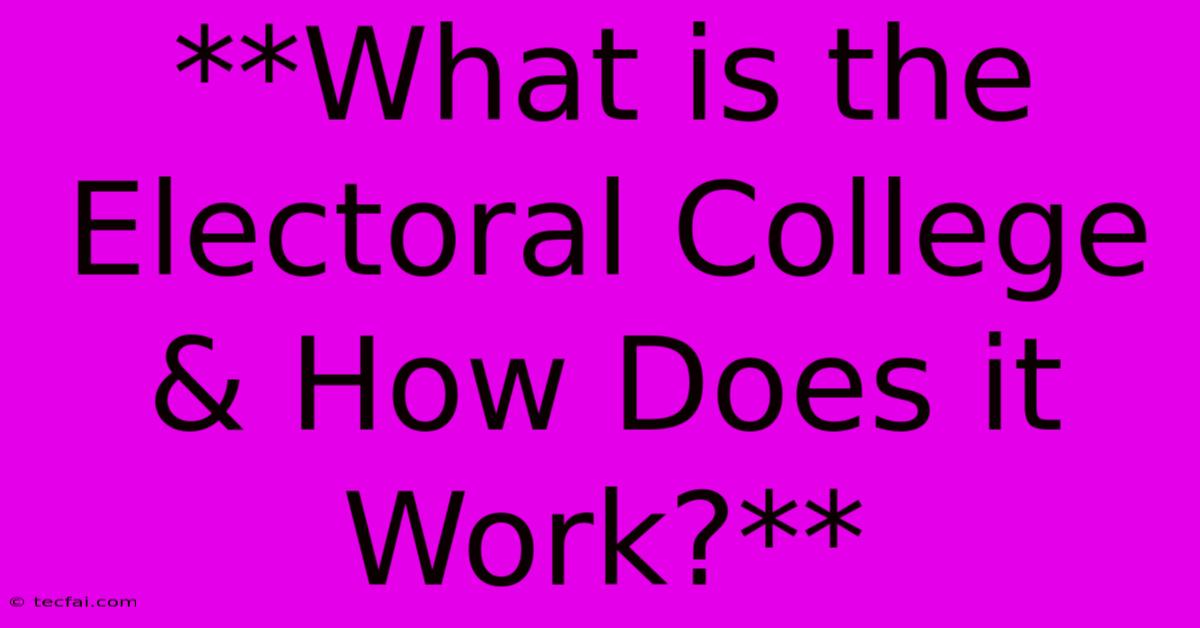**What Is The Electoral College & How Does It Work?**

Discover more detailed and exciting information on our website. Click the link below to start your adventure: Visit Best Website tecfai.com. Don't miss out!
Table of Contents
What is the Electoral College & How Does it Work?
The Electoral College is a unique and often controversial system used in the United States to elect the President and Vice President. While many people are familiar with the concept of popular vote, the Electoral College adds a layer of complexity to the presidential election process. This article will delve into the intricacies of the Electoral College, explaining how it works and its implications for the American political landscape.
Understanding the Basics
The Electoral College is a body of electors established by the Constitution, constituted every four years for the sole purpose of electing the President and Vice President. Instead of directly electing the president, citizens vote for electors who represent their state. Each state is allocated a certain number of electors based on its population, with a minimum of three electors (one for each Senator and one for each Representative in the House of Representatives).
The Electoral Vote Process
- Presidential Candidates: Candidates for President run on a national level but must secure the support of individual states.
- Popular Vote: On Election Day, citizens cast their votes for their preferred presidential candidate.
- Electoral College Votes: Each state's electoral votes are then awarded to the candidate who wins the popular vote in that state. This is often referred to as a "winner-take-all" system, although Maine and Nebraska have a slightly different allocation system.
- Electoral College Majority: To win the presidency, a candidate needs a majority of the Electoral College votes, which is currently 270 out of 538.
- Electors Meet: After the election, the electors meet in their respective states and cast their votes formally for President and Vice President.
- Inauguration: The candidate who wins the majority of electoral votes is inaugurated as President of the United States.
Key Aspects of the Electoral College
- Not Directly Proportional: The Electoral College system isn't entirely proportional to population. States with smaller populations have more electoral power per capita than larger states.
- Winner-Take-All (Mostly): The "winner-take-all" system, where the candidate who wins the popular vote in a state gets all of its electoral votes, can lead to a situation where a candidate can win the presidency without winning the popular vote.
- Faithless Electors: While rare, there have been instances where electors have voted for a candidate other than the one they were pledged to support. However, there is no federal law preventing this.
Arguments for and Against the Electoral College
Arguments in favor of the Electoral College:
- Protects Small States: The system ensures that smaller states have a voice in the presidential election and are not simply overshadowed by larger states.
- Promotes National Campaigning: Candidates are forced to campaign across the country, ensuring that issues relevant to all regions are addressed.
- Prevents Runaway Cities: The Electoral College prevents a situation where a handful of major cities could decide the outcome of an election, potentially ignoring the concerns of rural areas.
Arguments against the Electoral College:
- Unfair Representation: The system can give more weight to the votes of citizens in less populated states, potentially undermining the principle of "one person, one vote."
- Potential for a Minority President: A candidate can win the presidency with less than half of the popular vote, potentially representing a minority of the population.
- Discourages Voter Participation: The perception that the outcome of elections is predetermined in certain states can lead to voter apathy.
Conclusion
The Electoral College is a complex system with both advantages and disadvantages. Its future remains a subject of ongoing debate. Understanding its mechanics and implications is essential for informed participation in the American political process.

Thank you for visiting our website wich cover about **What Is The Electoral College & How Does It Work?**. We hope the information provided has been useful to you. Feel free to contact us if you have any questions or need further assistance. See you next time and dont miss to bookmark.
Featured Posts
-
Lattimore Traded To Commanders By Saints
Nov 06, 2024
-
Caitlin Clark A Wnba Game Changer
Nov 06, 2024
-
Jill Steins Impact On 2024 Us Election
Nov 06, 2024
-
Who Controls The Senate Election Results
Nov 06, 2024
-
Where To Register On Election Day Guide
Nov 06, 2024
